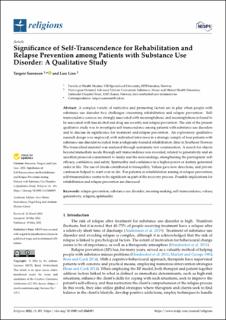| dc.contributor.author | Sørensen, Torgeir | |
| dc.contributor.author | Lien, Lars | |
| dc.date.accessioned | 2022-05-31T09:05:59Z | |
| dc.date.available | 2022-05-31T09:05:59Z | |
| dc.date.created | 2022-05-30T13:45:31Z | |
| dc.date.issued | 2022 | |
| dc.identifier.citation | Religions. 2022, 13 (6), 1-13. | en_US |
| dc.identifier.issn | 2077-1444 | |
| dc.identifier.uri | https://hdl.handle.net/11250/2996985 | |
| dc.description | This article is an open access article distributed under the terms and conditions of the Creative Commons Attribution (CC BY) license (https:// creativecommons.org/licenses/by/ 4.0/). | en_US |
| dc.description.abstract | A complex variety of restrictive and promoting factors are in play when people with substance use disorder face challenges concerning rehabilitation and relapse prevention. Selftranscendence sources are strongly associated with meaningfulness, and meaningfulness is found to be associated with less alcohol and drug use severity and relapse prevention. The aim of the present qualitative study was to investigate self-transcendence among patients with substance use disorders and to discuss its significance for treatment and relapse prevention. An exploratory qualitative research design was employed, with individual interviews in a strategic sample of four patients with substance use disorder recruited from a religiously founded rehabilitation clinic in Southeast Norway. The transcribed material was analysed through systematic text condensation. A search for objects beyond immediate needs through self-transcendence was revealed, related to generativity and an unselfish prosocial commitment to family and the surroundings, strengthening the participants’ selfefficacy, confidence, and safety. Spirituality and confidence in a higher power or destiny generated order in life. The use of rituals contributed to tranquillity. Values gave new directions, and private confession helped to start over in life. For patients in rehabilitation aiming at relapse prevention, self-transcendence seems to be significant as part of the recovery process. Possible implications for rehabilitation and relapse prevention are discussed. | en_US |
| dc.language.iso | eng | en_US |
| dc.publisher | MDPI | en_US |
| dc.rights | Navngivelse 4.0 Internasjonal | * |
| dc.rights.uri | http://creativecommons.org/licenses/by/4.0/deed.no | * |
| dc.subject | spirituality | en_US |
| dc.subject | religion | en_US |
| dc.subject | generativity | en_US |
| dc.subject | values | en_US |
| dc.subject | self-transcendence | en_US |
| dc.subject | meaning-making | en_US |
| dc.subject | substance use disorder | en_US |
| dc.subject | relapse prevention | en_US |
| dc.title | Significance of Self-Transcendence for Rehabilitation and Relapse Prevention among Patients with Substance Use Disorder: A Qualitative Study | en_US |
| dc.type | Peer reviewed | en_US |
| dc.type | Journal article | en_US |
| dc.description.version | publishedVersion | en_US |
| dc.rights.holder | © 2022 by the authors. Licensee MDPI, Basel, Switzerland. | en_US |
| dc.source.pagenumber | 1-13 | en_US |
| dc.source.volume | 13 | en_US |
| dc.source.journal | Religions | en_US |
| dc.source.issue | 6 | en_US |
| dc.identifier.doi | 10.3390/rel13060491 | |
| dc.identifier.cristin | 2028130 | |
| cristin.ispublished | true | |
| cristin.fulltext | original | |
| cristin.qualitycode | 1 | |

